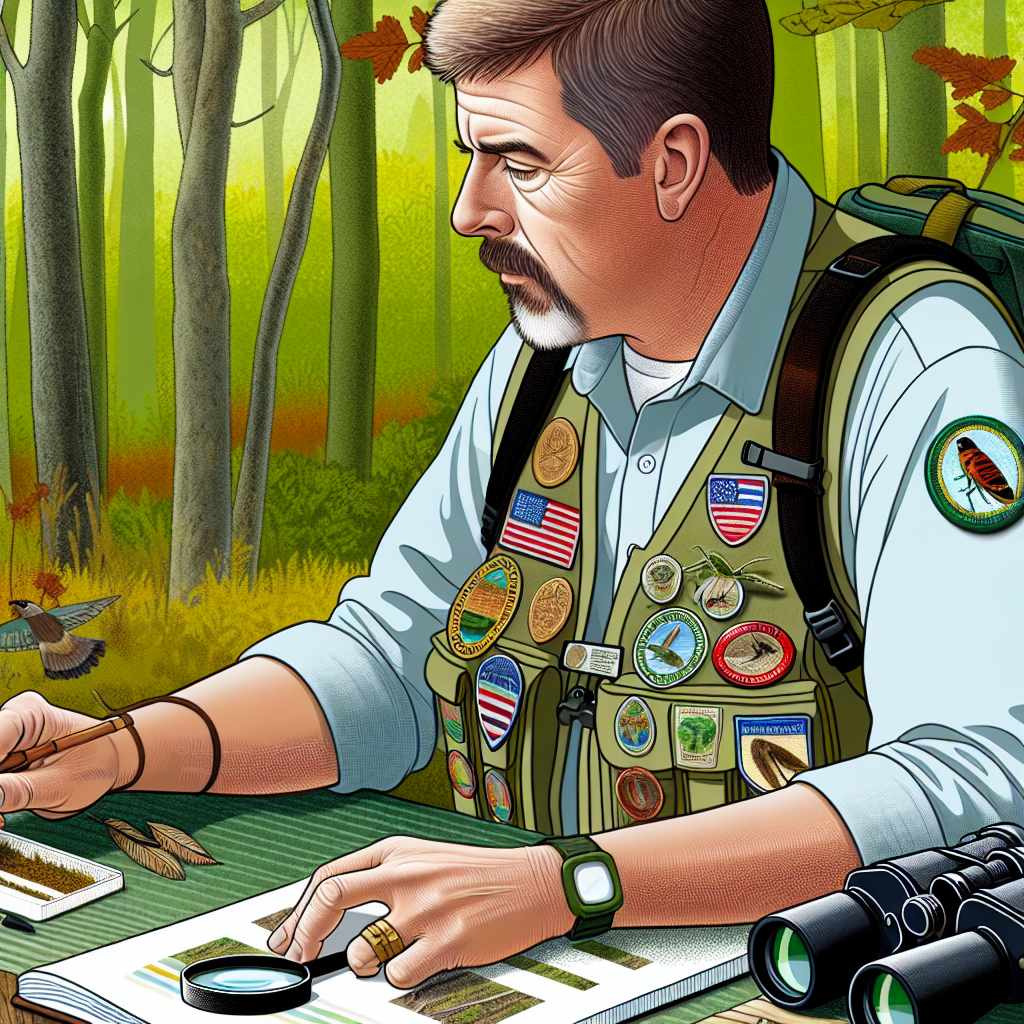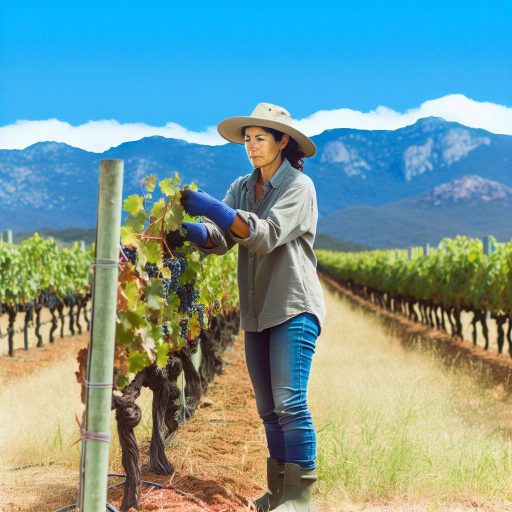Introduction:
Conservation scientists play a crucial role in protecting the environment and wildlife.
Their work involves researching, analyzing, and implementing strategies to preserve biodiversity and natural resources.
Key Skills Needed for Conservation Scientists:
- Strong Research Skills
- Data Analysis Skills
- Communication Skills
- Problem-Solving Abilities
- Technological Competence
- Collaboration Skills
- Adaptability
- Passion for Conservation
Strong Research Skills:
Conservation scientists must be able to conduct thorough research to understand the complexities of ecosystems.
They also need to develop effective conservation plans.
Data Analysis Skills:
Proficiency in data analysis is essential for interpreting research findings.
It is also important for monitoring the impact of conservation efforts on the environment.
Communication Skills:
Conservation scientists need to communicate their research findings effectively.
This includes proposals and recommendations to stakeholders, policymakers, and the public.
Problem-Solving Abilities:
They must identify conservation challenges and develop innovative solutions.
Conservation scientists also need to adapt existing strategies to changing environmental conditions.
Technological Competence:
Proficiency in using technological tools is critical for conservation scientists.
This includes software for data collection, analysis, and modeling.
Collaboration Skills:
Working collaboratively with other researchers and organizations is essential.
These include government agencies, NGOs, and local communities for successful project implementation.
Adaptability:
Conservation scientists should be adaptable in response to unforeseen challenges.
Flexibility is vital when priorities change or environmental conditions evolve.
Passion for Conservation:
Ultimately, a deep-seated passion for nature drives conservation scientists.
A strong commitment to conservation is essential in their important work.
Education and Background:
Conservation scientists play a critical role in protecting and preserving the natural environment.
In order to be successful in this field, individuals need to possess a diverse set of key skills that are essential for carrying out their work effectively.
Transform Your Career Today
Unlock a personalized career strategy that drives real results. Get tailored advice and a roadmap designed just for you.
Start NowOne of the first steps towards becoming a conservation scientist is obtaining the right education and background.
Choosing the Right Degree:
Individuals interested in pursuing a career in conservation science typically need to have a bachelor’s degree in a relevant field such as environmental science, biology, ecology, or a related discipline.
These foundational degrees provide students with a solid understanding of the natural world, ecosystems, and conservation principles.
Graduate-level education, such as a master’s or Ph.D. in conservation biology, can also be beneficial for those looking to advance their career and specialize in a particular area of conservation science.
These advanced degrees can provide a deeper understanding of complex conservation issues and help individuals develop advanced research skills.
Acquiring Additional Certifications:
In addition to formal degrees, conservation scientists may benefit from seeking out specialized training or certifications in conservation biology.
These additional qualifications can demonstrate to employers a commitment to the field and a willingness to stay current with the latest research and best practices.
Organizations such as the Society for Conservation Biology offer certification programs that cover a range of topics, from conservation planning to biodiversity assessment.
These certifications can help conservation scientists stand out in a competitive job market and demonstrate their expertise in specific areas of conservation science.
A strong educational background and relevant certifications can provide conservation scientists with the knowledge and skills necessary to make a meaningful impact in the field of conservation biology.
Fieldwork Experience:
Conservation scientists play a crucial role in preserving and protecting the environment and wildlife.
One of the key skills needed for conservation scientists is fieldwork experience.
This hands-on experience allows scientists to collect data, conduct habitat surveys, and monitor wildlife in their natural habitats.
Having hands-on experience with data collection is essential for conservation scientists.
They must be proficient in gathering and analyzing data to track trends in wildlife populations, habitat health, and other environmental factors.
This skill is crucial for making informed decisions and recommendations for conservation efforts.
Additionally, habitat surveys are a critical aspect of conservation work.
Conservation scientists need to be able to assess the quality of habitats and identify any threats or disturbances that may impact wildlife.
Conducting thorough habitat surveys helps scientists understand the ecosystem and develop conservation strategies to protect it.
Wildlife monitoring is another key fieldwork skill for conservation scientists.
Transform Your Career Today
Unlock a personalized career strategy that drives real results. Get tailored advice and a roadmap designed just for you.
Start NowMonitoring wildlife populations allows scientists to track changes in species numbers, behaviors, and health over time.
This data is essential for evaluating the success of conservation efforts and adjusting strategies as needed to support wildlife populations.
In addition to data collection, habitat surveys, and wildlife monitoring, conservation scientists must also have the ability to work in various outdoor environments and climates.
Fieldwork often takes scientists to remote locations, challenging terrains, and harsh weather conditions.
Having the resilience and adaptability to work in different outdoor settings is essential for successful conservation work.
Being able to work in various outdoor environments and climates requires physical and mental stamina.
Conservation scientists may need to hike through rugged terrain, endure extreme temperatures, and withstand long hours in the field.
Flexibility and a positive attitude in the face of challenging conditions are essential traits for conservation scientists working in the field.
Overall, fieldwork experience is a crucial aspect of the skill set needed for conservation scientists.
The ability to collect data, conduct habitat surveys, monitor wildlife, and work in various outdoor environments and climates are essential for successful conservation work.
By honing these fieldwork skills, conservation scientists can make a significant impact on preserving the environment and protecting wildlife for future generations.
- Hands-on experience with data collection, habitat surveys, and wildlife monitoring
- Ability to work in various outdoor environments and climates
You Might Also Like: Advanced Techniques in Plant Propagation
We cannot underestimate the importance of research skills for conservation scientists.
These skills are critical for gathering, analyzing, and interpreting data that inform conservation efforts.
Proficiency in Conducting Literature Reviews
Conservation scientists need to stay informed about the latest research and developments in their field.
This requires the ability to conduct thorough literature reviews to understand the current state of knowledge on a given topic.
Analyzing Scientific Data
Once data is collected, conservation scientists must be able to analyze it effectively.
This may involve using statistical software to identify trends, correlations, and patterns in the data.
Knowledge of Statistical Analysis
Statistical analysis is a crucial tool for drawing meaningful conclusions from data.
Conservation scientists should have a solid understanding of statistical methods and how to apply them appropriately.
Transform Your Career Today
Unlock a personalized career strategy that drives real results. Get tailored advice and a roadmap designed just for you.
Start NowResearch Methodologies
Conservation scientists must be familiar with a range of research methodologies to design effective studies and collect relevant data.
This includes knowledge of both quantitative and qualitative research approaches.
See Related Content: Using Satellite Imagery in Precision Agriculture
Communication Skills:
- Conservation scientists must effectively communicate findings to colleagues, stakeholders, and the public.
- Writing skills are essential for producing reports, grant proposals, and scientific publications.
Effective communication is a key skill that conservation scientists must possess in order to convey their research findings, proposals, and recommendations to a wide range of audiences.
This includes communicating with colleagues, stakeholders, policymakers, and the general public.
When working on conservation projects, scientists often collaborate with other professionals in related fields such as biology, ecology, and environmental science.
Being able to effectively communicate complex scientific concepts and data to these colleagues is crucial for successful collaboration.
In addition to communicating with fellow scientists and professionals, conservation scientists must also engage with stakeholders such as government agencies, non-profit organizations, and community groups.
These stakeholders play a critical role in decision-making processes related to conservation efforts.
Scientists must be able to clearly communicate their findings and recommendations to ensure that conservation goals are achieved.
Furthermore, communication with the public is essential for raising awareness about conservation issues and garnering support for conservation initiatives.
Conservation scientists must be able to effectively communicate with the general public through various channels such as educational programs, public events, and media outlets.
Writing skills are another important aspect of communication for conservation scientists.
Scientists are often required to produce reports, grant proposals, and scientific publications that document their research findings and contribute to the body of scientific knowledge in the field of conservation.
Reports are typically written to summarize research methods, results, and conclusions for internal use within organizations or for external stakeholders.
Grant proposals are written to secure funding for conservation projects and initiatives.
Scientists must be able to clearly articulate the objectives, methods, and expected outcomes of their proposed projects.
Scientific publications, such as journal articles, are important for sharing research findings with the broader scientific community.
These publications help advance the field of conservation science.
Writing these publications requires not only technical expertise but also clarity and precision in conveying complex scientific concepts to a diverse audience of fellow researchers.
Transform Your Career Today
Unlock a personalized career strategy that drives real results. Get tailored advice and a roadmap designed just for you.
Start NowSee Related Content: Forest Management Techniques for Conservationists
Problem-Solving Abilities:
In the field of conservation science, problem-solving abilities are essential for effectively addressing conservation challenges and achieving positive outcomes.
Conservation scientists must possess strong critical thinking skills to identify complex issues and develop innovative solutions that contribute to the preservation of biodiversity and sustainable management of natural resources.
One of the key skills needed for conservation scientists is the ability to think critically and analyze information to identify conservation challenges.
This involves the capacity to evaluate data, assess potential impacts, and recognize patterns or trends that may indicate threats to ecosystems or species.
By applying critical thinking skills, conservation scientists can identify the root causes of environmental degradation and develop targeted strategies to address these issues effectively.
Moreover, conservation scientists must demonstrate adaptability to changing circumstances and unforeseen obstacles that may arise during conservation projects.
Environmental conservation is a dynamic field that requires professionals to be flexible and resilient in the face of unexpected challenges, such as changes in policy, funding constraints, or natural disasters.
The ability to adapt to new situations and adjust conservation strategies accordingly is crucial for ensuring the success and sustainability of conservation initiatives.
In summary, problem-solving abilities are fundamental skills for conservation scientists, enabling them to address complex challenges and make meaningful contributions to environmental conservation.
By cultivating critical thinking skills and fostering adaptability, conservation scientists can effectively navigate the complexities of conservation work and help protect our planet’s natural resources for future generations.
-
Critical thinking skills to identify conservation challenges and develop solutions
-
Adaptability to changing circumstances and unforeseen obstacles
Learn More: Exploring Job Opportunities in Horticulture

Collaboration and Teamwork
One of the key skills needed for conservation scientists is the ability to work effectively in collaboration with diverse groups of scientists, researchers, and conservationists.
This involves the following:
- Working with diverse groups of scientists, researchers, and conservationists
- Collaborating with local communities and government agencies for conservation initiatives
Conservation scientists often work on interdisciplinary teams that include experts from various fields such as biology, ecology, forestry, and social sciences.
By collaborating with these diverse groups, conservation scientists can bring together different perspectives and approaches to address complex environmental challenges.
Furthermore, conservation initiatives often require working closely with local communities to understand their needs and perspectives on conservation efforts.
By involving local communities in conservation projects, scientists can ensure that initiatives are culturally sensitive and sustainable in the long run.
Government agencies also play a crucial role in conservation efforts, as they can provide resources, funding, and policy support for conservation projects.
Conservation scientists need to have the skills to collaborate effectively with these agencies to ensure that their research and conservation initiatives align with government priorities and regulations.
Transform Your Career Today
Unlock a personalized career strategy that drives real results. Get tailored advice and a roadmap designed just for you.
Start NowCollaboration and teamwork are essential skills for conservation scientists to successfully address environmental challenges and work towards sustainable conservation practices.
By working with diverse groups of experts, local communities, and government agencies, conservation scientists can develop comprehensive and effective conservation strategies that have a lasting impact on the environment.
When it comes to being a successful conservation scientist, there are several key skills that are essential for excelling in the field.
One crucial skill that is increasingly important in today’s technological world is technology proficiency.
Familiarity with GIS Software, Remote Sensing Technology, and Other Specialized Tools
Conservation scientists need to be well-versed in Geographic Information Systems (GIS) software.
This software allows them to analyze and visualize spatial data.
Remote sensing technology is also vital for collecting data from a distance.
This includes tools like satellite imagery or drones.
Additionally, there are many other specialized tools that conservation scientists may need to use depending on their specific research projects.
Ability to Use Technology for Mapping, Modeling, and Analyzing Ecosystems
Technology can be a powerful tool for conservation scientists when it comes to mapping, modeling, and analyzing ecosystems.
By utilizing GIS software, remote sensing technology, and other tools, conservation scientists can create detailed maps of ecosystems.
They can develop models to predict environmental changes and analyze the impact of human activities on biodiversity.
Technology proficiency is a crucial skill for conservation scientists to possess in order to effectively study and protect the natural world.
By being familiar with GIS software, remote sensing technology, and other specialized tools, conservation scientists can enhance their research capabilities.
They can make a meaningful impact in the field of conservation.
Essential Skills for Conservation Scientists
Conservation scientists require a diverse set of skills to succeed in their field.
They need strong analytical abilities to assess data and critical thinking skills to solve complex problems.
Effective communication skills are crucial for collaborating with stakeholders.
Additionally, proficiency in fieldwork and research methods is essential for gathering and analyzing data accurately.
Adaptability and creativity are vital for developing innovative solutions to conservation challenges.
Transform Your Career Today
Unlock a personalized career strategy that drives real results. Get tailored advice and a roadmap designed just for you.
Start NowConservation scientists must also possess a deep understanding of ecological principles and environmental policies.
The interdisciplinary nature of conservation science highlights the need for professionals to work across different fields, such as biology, ecology, and policy-making.
This multidisciplinary approach is crucial for addressing the complex and interconnected issues facing our planet.
As conservation efforts become increasingly critical in the face of environmental degradation and climate change, the role of conservation scientists remains paramount.
Their skills and expertise are essential for implementing sustainable solutions and preserving biodiversity for future generations.
The combination of technical skills, interdisciplinary knowledge, and a dedication to conservation makes conservation scientists invaluable in safeguarding the planet’s natural resources.
Their work is essential in shaping a more sustainable and environmentally conscious future for all.
Additional Resources
Conservation Scientists and Foresters : Occupational Outlook …
Career Map: Environmental Scientist | Department of Energy
[E-Books for Sale]
The Big Book of 500 High-Paying Jobs in America: Unlock Your Earning Potential
$19.99 • 500 High-Paying Jobs • 330 pages
Explore 500 high-paying jobs in America and learn how to boost your career, earn more, and achieve success!
See All 500 High-Paying Jobs of this E-Book
1001 Professions Without a Degree: High-Paying American Jobs You Can Start Now
$19.99 • 1001 Professions Without a Degree • 174 pages
Discover 1001 high-paying jobs without a degree! Unlock career tips, skills, and success strategies for just $19.99!




